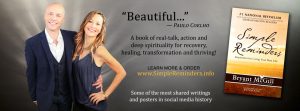The Velveteen Rabbit was one of those magic stories that saved my life. I remember the line drawings of the Bunny all alone on the hill, splashes of muted pastel colors behind him. The Bunny was so loved by the Boy that his fur was rubbed away and he was no longer new and pretty, but it didn’t matter because the Boy loved him. But then the Boy got sick and he was taken away and the Bunny was left alone.
This was the part of the story that began to take root inside of me. My dad contracted polio in the 1940s when he was the same age as the Boy, and even though the diseases were different, the story helped awaken empathy in me for the experiences of another. How scared my dad must have been to have suddenly found himself so sick! What treasured toys of his were taken away? I empathized with both the Boy and the Bunny, and I wanted more than anything for the Bunny to become real—to become loved alive—and if that could happen, maybe—even though my father’s right leg was shorter than his left leg, and even though his gaze often rested on distant things I couldn’t see—I could love my dad back alive too.
That 1922 edition of Margery Williams’ The Velveteen Rabbit was my version of the book. My rabbit. My boy. My playroom and wise old Skin Horse. William Nicholson’s illustrations helped make it mine. When later editions hit the shelves, the new illustrations (lovely though they were) were jarring. That’s not my bunny! That’s not my story.
This seems ludicrous on the surface, but talk to a fan of a book when the movie comes out and you’ll get a step-by-step guide of what didn’t match up and how the actors didn’t fit the images the reader had put in her head. Readers claim ownership of the fictional worlds they inhabit, and rightfully so—they helped to create those worlds using the signposts the author provided through text. The reader’s experience with the story is so intimate and so real that it comes as a shock when another reader has a different relationship with the same story. No one can enter the web of words the same way, and no one comes out the other side unchanged either.
Why do books matter? Why do fiction writers matter? Why is fiction reading still relevant? The world changes, evolves, and by necessity leaves behind what no longer fits. The thing is, stories always fit. They take us by the hand and pull us into worlds we didn’t know existed—not the world of the writer, but the world that was within us. Our hidden interior world, on the trigger of a turn of phrase, can expand into new ways of being in and relating to the world. Our experiences with characters and adventures on the page make us move in surprising ways. They give us a window into a way of life we’d never know or a belief system that challenges us and stretches our capacity to care. The author might have been writing five hundred years ago or just yesterday. It doesn’t matter. The readers are the wild card. Each reader co-creates her own story and makes it personally relevant and then engages with the world from that new, changed place.
Our lives are very different from when that first edition of The Velveteen Rabbit captured hearts. Much of what fuels our economy is not a physical product that we can ship and store. Our productivity is intellectual. It’s artistic. It’s creative. And it doesn’t always sit on a shelf. It isn’t warehoused and it isn’t collecting dust. This is an economy of ideas and of inventions based not on a combustible engine, but rather a combustible spirit. As Seth Godin tells us in The Icarus Deception, this is the time of the creatives, the artists, the dreamers and imaginers. This is the time for magic. But it’s hard to put magic in a spreadsheet. It’s hard to make a pie chart or a PowerPoint slide about its benefits. But make no mistake. Our modern age runs on magic. It runs on someone alone in a room with an idea to make the world a little bit better. Innovation and invention start with imagination—the world of fiction.
Who would have thought we’d go to the moon, or store our documents in a cloud, or type a manuscript from across the room from the computer? Who would have thought, until someone did, and then what had once been purely fiction became the norm. Then the standard. But before it became the standard, it was inconceivable. It was impossible and then someone dreamed it. Someone shook the fairy dust and came up with an electric car, solar power, Apple computers, airplanes and stories.
If you are one of the ones with a passion for writing, reading or both, the Stories—written and unwritten—need you to stand up and get Fierce. If it is your gift to create stories, it is your duty to sustain that gift and ensure that it has a space to thrive and a way to reach those who need it. But your work is only half-alive until it meets up with its readers, and readers, it’s time to get active and demand the kinds of fiction that will challenge you and open your heart. We can no longer afford to play it safe.
This isn’t the time of sequestration for artists. This is the time of artists alive and integrating in the world. We—the Fierce Writers—are being called to do more than just write our books. We—the Fierce Readers—are being called to do more than just read what the Big Publishers tell us we want to read. We must become ambassadors for the necessary life-changing stories trying to do their work in the world. We must champion them, lest they languish in computer files, barely breathing, alone without the companionship of their beloved readers. As Stephen Cope reminds us in The Great Work of Your Life, it is not enough to have the gift. We must sustain it. We must create the conditions necessary for its survival. That’s what it means to be entrusted with a gift.
Readers are the writers’ partners in creation. Without eyes on our words, our stories have only partly lived. The readers—not those who are passive consumers of data, but the Fierce Readers who immerse themselves in our fictive worlds—come to book festivals because Stories influenced them in some way, and because Stories helped them move in some previously unimagined direction. When a writer writes what is in her to create, the story heals her and pulls her forward into a new stage of her life. When a reader is absorbed by a narrative, that narrative also changes him. By engaging in that story’s realm, his own world is irrevocably altered.
Stories are hungry. They demand attention from both sides. Fierce Reading and Fierce Writing demand skill sets that have fallen by the wayside in our fast-paced world. Both reading and writing demand patience, persistence, perseverance, and gratitude. They require silence and a willingness to stay with our own selves long enough to let profound change wash over us.
“Let me tell you a story,” whispered Scheherazade to her husband, Shahryar, the King. “Let me spend my last night on earth telling tales.”
The King, who had made a nasty habit of killing his brides on the day after their wedding night—1000 women to date—reluctantly agreed. Scheherazade was literally betting her life and the lives of any remaining women in her realm on the power of stories. And as you know, it worked. The King was so enthralled with the seductive magic of her stories that he spared her life. Night after night after night until Scheherazade had given him three sons and his heart had opened. Stories saved her life, the lives of others, created new life, and profoundly changed the King’s way of living in the world. No swords. No guns. No bombs. Just a story. 1001 of them.
Right now, the Velveteen Rabbit snuggles deep under covers with his Boy. Sherlock Holmes is solving unmentionable crimes. Laura Ingalls and her family leave their Michigan home in a covered wagon, their bulldog Jack trotting beside them. Katniss prepares for the fight of her life and Alice falls down the rabbit hole. Bilbo Baggins starts his quest, Harry Potter finishes his, and Charlotte the Spider and Wilbur the Pig make friends in the barn. The stories that have taken root in our hearts and minds live in a continuous loop, feeding our current lives with the richness of their escapades and reminding us how the meaning we once made from their adventures could be relevant to us today now that we’ve become sensible and grown-up.
Who do you remember from the tattered pages of your childhood? Who kept you company, flashlight perched between your knees, as you read in secret?
Today, bankrupt counties have begun closing their public libraries. Schools, ever-struggling to meet the latest standardized educational mandate, have had to squeeze impossible goals out of pennies. Shuttered school libraries have been the victims of line item cuts. New national curriculum standards favor non-fiction work over fiction. We are sending the message to our children, our writers, and our readers that fiction has no more use in a modern era. Our bookstores, at least in the ways we’ve known them, have fallen, book prices are rising, e-books are banging on the door and we—the writers and readers of fiction—watch, wide-eyed, from the edge of a new world.
We stand one foot in analog, one foot in digital, unsure of where to go or how to find each other anymore. Writers and readers are disconnected from each other, even as we are told they are more connected than ever. We are held hostage by the algorithms of our own search strings. You have bought this before! You will like this! You have never read this; therefore you would never want to. Let us help you find what we already know you want, and this convenience and this personal attention will make you trust us, and when that happens, you will forget how you once were. You will forget that you had once been able to make up your own mind—to walk into a bookstore and pick up the orphaned book in the aisle that leapt out at you as if by some unseen hand. You weren’t looking for it, but it was there, and so you took it home, and that made all the difference.
Human beings intersect beyond algorithms and spreadsheets and lists of common values. We intersect in the imagination. Fiction explores that realm—the world of the currently impossible—the intersection between play and promise. Fiction makes us dream, and because it’s not bound by the need to prove how something is possible, anything can exist. And it is precisely this kind of magical thinking that is required to keep leading us forward into the future.
It’s time to change the conversation. Writing used to be dangerous. It used to get the attention of the authorities, the newscasters, the ones in power. Reading used to be subversive. If a person could read, she could take a different action than the one laid out for her by those in power. Who knew what revolutionary things could happen when reading and writing dared to come together and make Story? It was all too risky to be allowed. Writing—and the exchange of writing that occurs through the collaborative act of reading—gets people moving. It threatens the status quo. And heaven knows, we can’t be having any of that in this standardized, modernized, sanitized age.
Can we?
https://www.laraineherring.com
https://www.fiercemonkeytribe.com
@laraineherring



Featured image courtesy of Linda Tanner.

